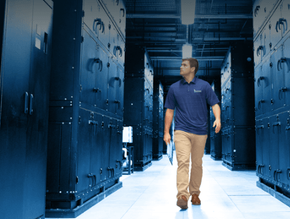HPE Continues to Advance Computing in Space With the ISS

Hewlett Packard Enterprise (HPE) has announced it has sent a third iteration of its Spaceborne Computer to the International Space Station (ISS), with the goal of providing the international scientific community access to an expanded scope of space-based edge computing, AI and machine learning (ML) capabilities.
Built from commercial off-the-shelf servers, the goal of HPE Spaceborne Computer-2’s latest trip is to build upon the system’s previous success while expanding the scope and complexity of data centre-level processing and high performance computing (HPC) that can be done in space, including AI and ML workloads.
Edge computing to advance space exploration
The HPE Spaceborne Computer is designed to deliver data centre performance and targeted AI capabilities in order to meet in-orbit processing needs, advancing space exploration as a result.
Edge computing, using the HPE Spaceborne Computer-2, has created a number of breakthroughs in space exploration, from monitoring astronaut health on long space missions to aiding weather predictions and response recovery efforts on Earth.
It has also proven to accelerate time-to-insight for critical research and innovation needs on the ISS. HPE has previously highlighted that further exploration will require reliable edge computing to process data and run applications that are critical to human survival in space.
Satellites are essential to observing Earth from space to study science and climate, as well as support disaster response. Using HPE Spaceborne Computer-2, researchers have been able to test several deep learning inference networks to automatically interpret remote sensed images from land and structures after a disaster.
These can include determining the extent of flooding and to track urban building damage, such as from hurricanes or earthquakes. These techniques could be used onboard future spacecraft to rapidly deliver actionable products to relevant authorities to assist in disaster recovery.
HPE helping advance research on Earth and in space
When it comes to data centres, edge computing can impact IoT, AI and other advanced applications. NASA has ultimately worked to optimise HPE Spaceborne Computer-2 and added new features to it, including a 10 gigabit Ethernet.
Generally, HPE considers USB ports on data centre hardware a vulnerability that should be avoided. However, given that ISS is not a typical data centre facility, both organisations state that USB ports were added due to the fact that the crew must analyse data very frequently.
After installation of HPE Spaceborne Computer-2 is completed on the space station, the system will be used by researchers to advance innovation and save time.
Traditionally, data gathered in space was collected aboard the research outpost and sent to Earth for processing. Having an onboard supercomputer means that data can be evaluated in low Earth orbit in near-real time, making it possible to achieve a 30,000 times reduction in download size by only transmitting the data output, or insight, to Earth instead.
Research slated for HPE Spaceborne Computer-2 includes a federated learning (FL) experiment that will independently train ML models and inference engines that were originally created on the Cloud. The experiment will be collaborated on and operated by cloud service providers to contribute to ML training models used on Earth and maintain an up-to-date AI inference engine in space.
“The Spaceborne Computer has the potential to not only accelerate data processing in space but also speed up the exchange of data insights between Earth and space,” Mark Fernandez, Principal Investigator for HPE Spaceborne Computer-2, tells the ISS National Laboratory.
“This ultimately streamlines in-space research and bolsters the application of edge computing, AI and ML on the space station.”
******
Make sure you check out the latest edition of AI Magazine and also sign up to our global conference series - Tech & AI LIVE 2024
******
AI Magazine is a BizClik brand






